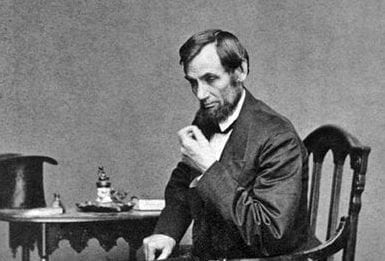


Next Document
Chapter 16: Reconstructing the South
August 05, 1863
Conversation-based seminars for collegial PD, one-day and multi-day seminars, graduate credit seminars (MA degree), online and in-person.

New Orleans came into Union hands in April 1862 and much of Louisiana followed. It was among the first Confederate states to be re-occupied through Union military action. As an occupied territory, it was under military authority, including that of the Commander of the Union’s Gulf Forces, General Nathaniel Banks (1816-1894) from Massachusetts, a former Speaker of the House of Representatives. He wrote President Lincoln about his efforts in Louisiana on April 17, 1863. Lincoln appreciated the political minefield that Banks faced. Unionists in Louisiana were lukewarm and unwilling to act, while secessionists wanted a restored Louisiana allowed into the Union with slavery unimpeded, or with as little change to race relations as possible. Banks experimented with mandatory contractual relations, where slaves would be under contracts to their old masters as a temporary measure, and also with efforts to graft a new state constitution onto the old. These efforts raised important issues about how a reconstructed government would be organized, whether defeated Southerners were ready to emancipate freedmen (since the Emancipation Proclamation had been issued on January 1, 1863), and what role the national government should take in the reconstruction of the state governments. Lincoln deliberated on these issues and answered Banks in August 1863 (after the victory of Vicksburg on July 4, 1863, which put the entire Mississippi in Union hands).
My dear General Banks,
Being a poor correspondent is the only apology I offer for not having sooner tendered my thanks for your very successful, and very valuable military operations this year. The final stroke in opening the Mississippi never should, and I think never will, be forgotten. . . .
. . . While I very well know what I would be glad for Louisiana to do, it is quite a different thing for me to assume direction of the matter. I would be glad for her to make a new Constitution recognizing the emancipation proclamation, and adopting emancipation in those parts of the state to which the proclamation does not apply. And while she is at it, I think it would not be objectionable for her to adopt some practical system by which the two races could gradually live themselves out of their old relation to each other, and both come out better prepared for the new. Education for young blacks should be included in the plan. After all, the power, or element, of “contract” may be sufficient for this probationary period; and, by its simplicity, and flexibility, may be the better.
As an anti-slavery man I have a motive to desire emancipation, which pro-slavery men do not have; but even they have strong enough reason to thus place themselves again under the shield of the Union; and to thus perpetually hedge against the recurrence of the scenes through which we are now passing. . . .
For my own part I think I shall not, in any event, retract the emancipation proclamation; nor, as executive, ever return to slavery any person who is free by the terms of that proclamation, or by any of the acts of Congress.
If Louisiana shall send members to Congress, their admission to seats will depend, as you know, upon the respective Houses, and not upon the President.
If these views can be of any advantage in giving shape, and impetus, to action there, I shall be glad for you to use them prudently for that object. Of course you will confer with intelligent and trusty citizens of the State. . . . Still it is perhaps better to not make the letter generally public.

Conversation-based seminars for collegial PD, one-day and multi-day seminars, graduate credit seminars (MA degree), online and in-person.